The 2012 BMW 328i Takes on the Competition from Audi, Infiniti, Mercedes, and Volvo
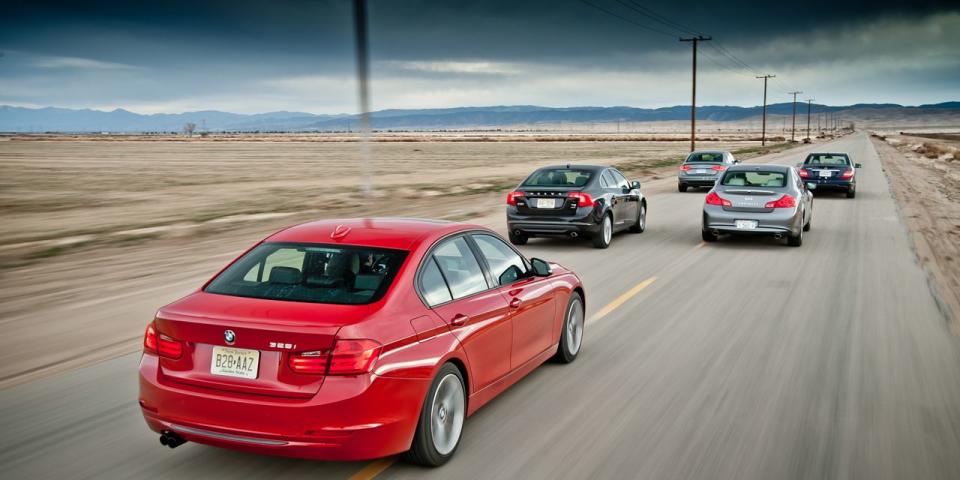


A new BMW 3-series sedan is finally here. That means the often lauded last-generation 3’s days are numbered, and it will soon give way to redesigned coupes, convertibles, and M versions. We’re a little sad to see the previous 3-series go, as it didn’t necessarily need to be redone. Even in its last year, the 3-series treated its competition like a bull treats a rodeo clown. Sure, you sort of admire the goofy bravery of the guy in floppy shoes, but the bull always has him on the run. That is, unless you’re in Mexico or Spain, but that’s a whole other sport.
Is the new 328i still capable of sending the clowns scrambling? Are the other cars in the segment even all that laughable anymore? We gathered an Audi A4 2.0T Quattro, an Infiniti G25 Journey, a Mercedes-Benz C250 Sport, and a Volvo S60 T6 AWD—each fitted with an automatic transmission—to find out.
If we’d assembled this group last year, only the Audi would have been equipped with a turbocharged four-cylinder. This year, three of the five cars in the test have four-bangers under their hoods. The two new four-cylinder cars are the entries from BMW and Mercedes, each of which chopped two cylinders and added a turbocharger to create more-efficient base engines.
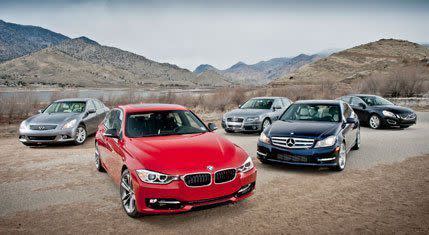
This is the new reality of mid-size sports sedans: Each generation of these cars gets physically larger and more technology-laden to meet perceived customer demands and to satisfy competitive zeal. But, increasingly, each is powered by a smaller, theoretically more fuel-efficient engine in order to serve other masters.
Infiniti has gotten into the downsized engine business, too. But instead of cutting cylinder count and adding a turbo, the company offers a smaller version of its familiar VQ-series V-6. So we invited the G25 to this rodeo, even if that meant it would be the cheapest car in the test.
This being a comparison of the little-engined sports sedans, we considered borrowing an S60 T5. At the time of our test, though, the new T5/all-wheel-drive powertrain combination was not available. And putting a less powerful engine into this only mildly sporty front-drive sedan would have put it at a huge disadvantage here. So we brought out the brawny 300-hp S60 T6. It lorded a distinct power advantage over the other competitors, although that didn’t mean much when we hit the back roads.
So the game has changed. And the bull of the segment has changed along with it. Will it end up bloodied and in the butcher’s case? Or is it still an SOB you don’t want to mess with, even if it’s short a couple of Rocky Mountain oysters?
The S60 T6 is an automotive opiate. The mere act of sitting in it puts you at ease. Its softly padded, supportive chairs are probably the most comfortable seats in any car, at any price. To sit in them is to feel a rolling wave of endorphins transporting you to your happy place.
There isn’t a single part of the Volvo’s design that draws negative attention; every part works in harmony. This is the vehicular equivalent of a verdant, weed-free lawn on a sunny, 72-degree Sunday. Every blade of grass has been trimmed to the same height. In the S60, the engine hums its mantra in the distance. The exhaust is a faint snore. Soft exterior contours melt at just the right angle. The interior is awash in richly grained surfaces and soft leather. At night, the simple, clear gauges are bathed in a white light, not coldly backlit like the dials of the rest of the group. The Volvo soothes so effectively that you almost expect to hear an anesthesiologist asking you to count backward from 10.
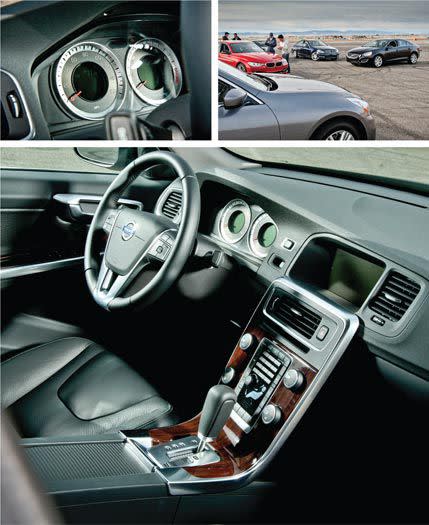

A five count is about all that is necessary for the S60 to hit 60 mph. The Volvo can achieve alarming speeds courtesy of its turbocharged 300-hp, 3.0-liter inline-six. The most powerful engine in this test thrusts the 3792-pound AWD S60 (heaviest as well) to a 0-to-60 time of 5.5 seconds. But adding speed to the scenario upsets the Volvo. Speed and opiates don’t really mix.
We forced the Volvo to try to keep up with the rest of the group on a winding mountain road, and the Volvo’s relaxed responses, slow steering, general unwillingness to change direction quickly, and substantial curb weight conspired against it. Carrying 62 percent of its weight over the front axle, the S60 punishes its front tires with squealing understeer. A suspension at ease on the interstate feels sloppy as the body rolls excessively in corners. To get the Volvo to keep up in curves, we had to hammer the brakes to slow down to a crawl on entry, turn in, and then use the thrust of the turbo six and the grip of the all-wheel-drive system to rocket out of the bend. Eventually, the front brakes started sending us smoke signals that clearly meant “Cut it out.”
A sports sedan shouldn’t admonish its driver, and so the Volvo finished last in this comparison. But opiates have their fans, and they should find the S60 extremely addictive.
A midcycle refresh has brought new life to Mercedes’ smallest sedan. The last time we compared a C-class against a 3-series, we complained about the Benz’s low-grip tires, floppy shifter, and unimpressive interior materials. Mercedes has addressed our gripes. Our C250 arrived with Continental ContiSport Contact 3 summer tires that clung to the skidpad with a best-in-test 0.90 g. To take care of the loose manual shifter, Mercedes simply stopped offering it: In place of the six-speed manual is a quick-shifting seven-speed automatic. And Mercedes has completely redone the interior to mimic the design and material quality of the pricier E-class. You’d think that all of these changes would make for a winner, but Mercedes has also made a few less-benevolent alterations here.
Base C-classes are now powered by a turbocharged 201-hp, 1.8-liter four-cylinder instead of a 228-hp, 3.0-liter V-6. We didn’t ask for that. Acceleration lags behind that of the C300 we tested in 2008. Many drivers will find the 229 pound-feet of torque—available from 2200 to 4300 rpm—adequate for most situations. That’s because, as with a turbo-diesel, the C250’s low-end grunt makes it feel far stronger than its peak horsepower figure would indicate. Passing power is superb. The C250 posted a quicker 30-to-50-mph acceleration run than the more powerful 328i. But rev past 4300 rpm, and the surge tapers off, a grim reminder of its 201 horsepower. We could forgive the Benz’s engine if it returned excellent fuel economy, but its observed 19 mpg put it behind the larger, more powerful turbo fours from Audi and BMW. On the plus side, the four-holer doesn’t make cheap or unrefined noises. A low-rpm gargle smooths out as the engine spins toward its 5500-rpm horsepower peak. At its loudest, the engine emits only 72 decibels of whir.
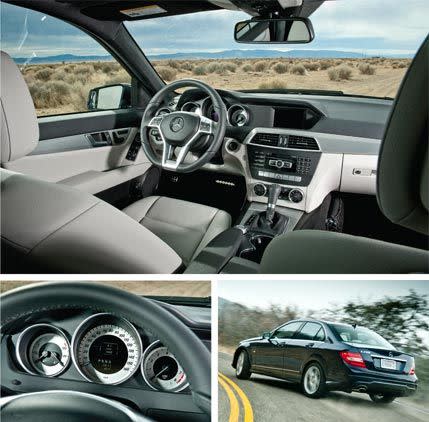

Like all Mercedes vehicles, the C250 is based on a solid structure equipped with a supple suspension. It’s clear that the C250 comes from the same folk who forge the S-class and the G-wagen. It might be small, but aside from the flat-bottom German-taxi–grade seats, small doesn’t equal cheap here. The C250 is the right kind of little, feeling tidier than its 180.8-inch length. We were shocked to learn that the Volvo is only 1.4 inches longer than the Benz, as the S60 feels about 1.4 feet longer. A low cowl, excellent outward visibility, a narrow cabin, and light steering help the C250 shrink as you drive it. And thanks to its lowest mass in the test, the Mercedes changes direction without a fight. The C250 earned silver in the slalom competition, only 0.1 mph off the A4’s 44.3-mph speed.
A couple of the drivers on this test would be delighted to park a C250 in their garage. But lackluster acceleration times hurt the Benz’s overall score and largely determined its fourth-place finish. Since Mercedes seems to be granting our wishes lately, we’ll take this opportunity to ask for a bit more horsepower next time around.
We discussed whether or not to include a G37 in this test. One side argued that Infiniti’s bigger-engined G more closely matches the as-tested prices and acceleration of the group. The other side argued that the G25’s small-displacement V-6 is more in keeping with the downsized engines of the German entries, plus the smaller six doesn’t buzz like a blender set to “frappé.” Rather, its buzziness more closely resembles a blender on its “stir” setting. We hoped that the price, economy, and NVH advantages of the G25 would help offset its lackluster acceleration, but it didn’t quite work out that way.
Its 0-to-60 time of 7.5 seconds is two off the Volvo’s pace. With 2.5 liters of displacement and no turbocharger, the V-6 worked harder than any other engine in the test, returning only 18 mpg. And yet, the G25 managed a third-place finish by virtue of its best-in-class handling and steering feel. No other sedan here could match the tactility and natural feedback coming through the G’s three-spoke steering wheel. There are times when the G25’s lively and sometimes tail-happy chassis makes you think you’re in a Nissan 370Z. Goodyear Eagle RS-A all-season tires break away with plenty of warning and cling hard enough to the skidpad to allow the G25 to match the grip of the summer-tire-equipped A4. Despite the low-energy powerplant, the G will hustle down any mountain road. Just don’t expect it to hustle up said mountain road.
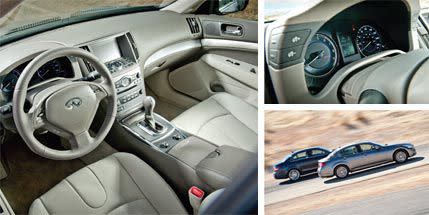

Plus, after six years in production, the G is looking dated. It’s the old man of the Infiniti lineup, and the cabin design is rooted in the last decade. The rental-car taupe-and-gray two-tone colors didn’t help the interior’s cause. Still, we enjoyed the sports-car-like seating position and the nearly vertical steering wheel that adjusts with the instrument cluster.
Opting for the G25 Journey saves $2400 compared with a similarly equipped G37. And while the G37’s extra power would have provided acceleration that more closely matched the others’, we’re not convinced it would have vaulted the G to the top of this heap. Seems to us that a G31 would be the ideal compromise, were Infiniti to produce such a car, which it doesn’t.
After 40,000 miles in a long-term A4 2.0T Quattro, we went into this test expecting the same A4. We were wrong. Last year, Audi switched from a six-speed automatic to an eight-speed auto, and it has had a transformative effect. Acceleration to 60 mph has gone from a lackluster 6.4 seconds to 5.6. That’s good enough to tie for second place in this test and only 0.1 second behind the 300-hp Volvo. Adding speed has changed the character of the A4—it has gone rabid on us, but in a good way. On unfamiliar mountain roads, the A4 is always the alpha car, leading through the curves and pulling ahead of the pack.
Audi has been in the direct-injection turbo-four game longer than the competition, and it shows. Despite this engine’s age, it still impresses with its smooth character and immediate power delivery. The 258-pound-foot torque peak arrives at a diesel-like 1500 rpm. All-wheel drive allows the A4 to explode off the line—it led the group with a 1.8-second time to 30 mph. With eight speeds at its disposal, the engine is never out of its sweet spot.
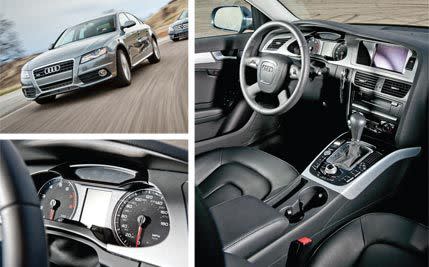

Throw the A4 into a corner, and the front end plows delicately and predictably. It’s not the most joyous way around a bend, but it is repeatable and secure and requires very little skill. Joy in the A4 means going faster and sweating less. The A4 sliced and diced its way through the slalom at the highest speed, thanks to its low center of gravity and uncanny connectedness to the road. Steering feel and feedback trailed the Infiniti’s, but it presented better communication than the remainder of the clan.
Slow down, and the Audi comports itself. It remains taut, but it never punishes. Luxury and sport reach a happy medium here. Its design aesthetic is elegantly clean and mood elevating. In the end, it finished only five points behind the BMW. Could the previous 3-series have beaten this Audi? Probably. But we’d wager that the old 3-series might also have beaten the new 3-series.
The new 328i looks a lot like a dehydrated 528i, especially from the rear. Inside, the design is a mix of 5-series and the previous 3. All of the electronics work as well as they did in last year’s car—no problems there. A larger exterior and a 1.9-inch-longer wheelbase bump up cabin space enough that the BMW’s rear seat topped our subjective comfort and objective space categories. Mass is up by 133 pounds over the last 328i, but the new 328i’s 3485-pound curb weight is only 38 pounds greater than the smaller and lightest-in-test C250. So far, so good.
Start the new 2.0-liter turbo four cold, and its clicking and pulsing direct injectors make it sound, from the outside anyway, like you’ve fired a diesel. Once warm, the engine quiets down, and excellent sound-deadening keeps the clatter from approaching the driver’s eardrums. Its 40-decibel idle is whisper quiet. Accelerate, and the 328i jets from 0 to 60 in 5.6 seconds, tying the Audi as the quickest non-Volvo of the test. A tiny bit of four-cylinder coarseness asserts itself, but the engine revs almost as smoothly as the outgoing naturally aspirated six. With 240 horsepower and 255 pound-feet of torque, the turbo four easily surpasses that old six’s output. Power is delivered evenly from just off of idle all the way to the 7000-rpm redline. Note that the BMW is the only car here that shifted at redline: The 328i’s new eight-speed auto—similar in design to the A4’s auto—was deemed the best-applied transmission in the test. Even after hammering the 2.0-liter for 300 miles, it returned the best fuel economy of the bunch—21 mpg.
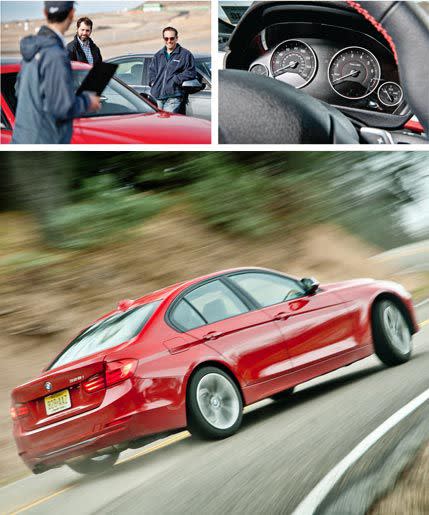

Chasing high mpg numbers means that many BMWs—even those with the Sport Line’s 18-inch wheels—will have all-season run-flat tires bent on saving fuel. Low-rolling-resistance rubber is designed to keep rolling, which is why the 328i stopped from 70 mph in a full-size-SUV-like 191 feet. Stops were at least consistent and free of any fade. The pedal remained firm, responsive, and progressive. Subjectively, the brakes are great, but they’re severely let down by the tires. Even wearing its run-flats, though, it exhibited a noticeable improvement in ride quality over the last 3er. BMW is getting better at tuning suspensions for the heavy and hard tires it fits to its cars.
The brand’s obsession with even weight distribution pays handling dividends. Front and rear tires seem to work equally hard. The new 3 most closely resembles the previous car in its balanced feel and nearly neutral handling. The most glaring difference between 3-series new and old is the new electric power steering’s feedback. First, it’s far lighter than before. That’s not necessarily a bad thing. That the electric power steering doesn’t offer much feedback or feel is a bad thing, though. At least it is accurate, allowing you to place the car precisely in a corner without lost motion. Our beef is that the primary communication between driver and road—the steering—is now pleading the Fifth. Please, BMW, remedy this fault.
What we’re left with is a 328i whose personality is less distinct than that of the car it replaces, and we’d grown to love the old personality. The 335i we tested last month wore sportier tires, and its steering, while still light, had more feel than the 328i’s here. Tires more worthy of a sports sedan would go a long way to improving the 328i’s chassis performance. But maybe that tire choice is emblematic of a new approach at BMW, one that values fuel economy and rear-seat space and comfort more than it once did. This diminishes the dynamic gap between the 3-series and its ever-improving competitors, even as it results in an empirically better car. Indeed, the 328i’s virtues are considerable, even with a bloated, $50,870 sticker price. But if you’re put off by this more mature, less ornery bull, find yourself a previous-generation 328i. New ones are still out there.
You Might Also Like

 Yahoo Autos
Yahoo Autos 